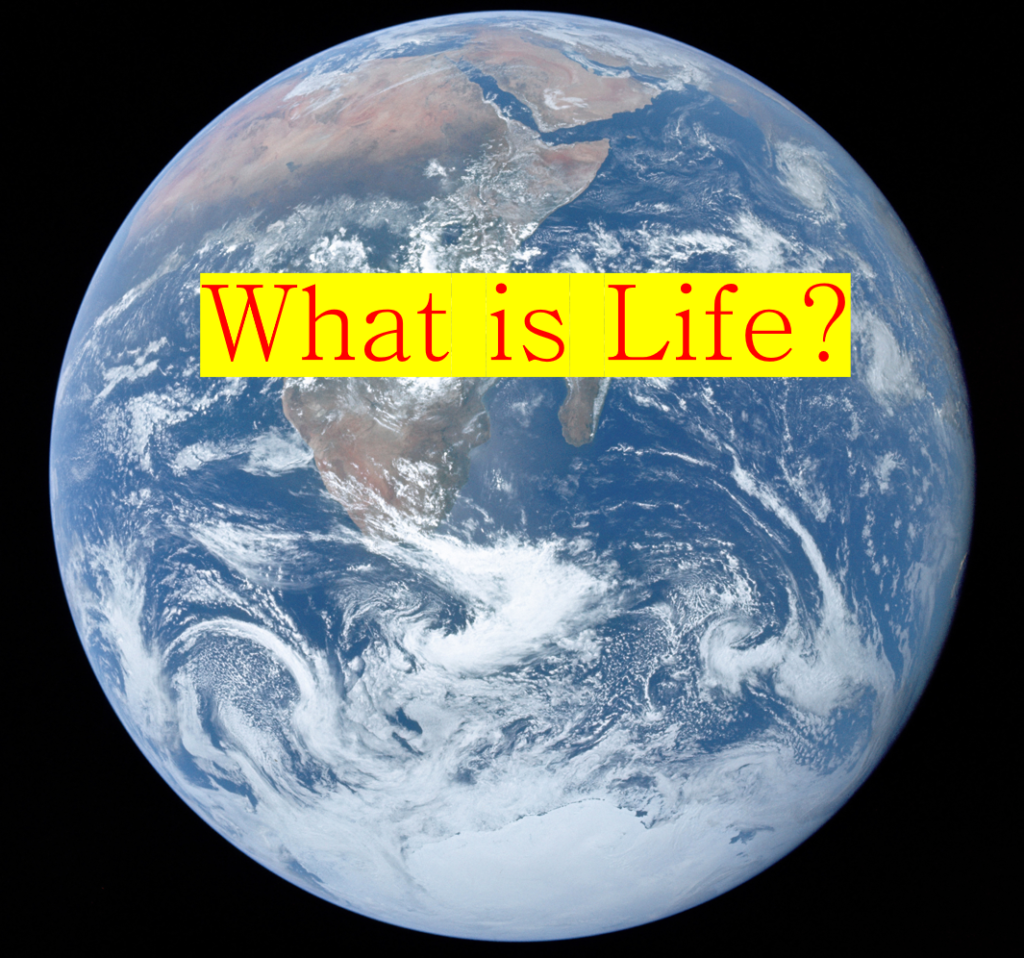What is Life? An answer from the first-person perspective
Since the times of Plato and Aristotle, philosophers and scientists have questioned the nature of life. Is organic matter different from non-living one? Can life be explained away only with the laws of physics and chemistry, or does a vital force, what French philosopher Henri Bergson called the “élan vital”, determine the difference between living and non-living matter? Is there something special in life, or is it just a piece of more complicated machinery emerging from material processes? Is it only an emergent bottom-up property of matter, or is there more?
Even the famous physicist Erwin Schrödinger wrote a famous booklet entitled “What is Life?”, and, interestingly, predicted the existence of a hereditary memory in cells that later would have been identified in the DNA molecule. But, whatever opinion one might nurture on the topic, the fact is that until nowadays, there is no universal consensus and definition that characterizes satisfyingly the process that we call ‘life.’ Despite all the progress of biological sciences, an all-comprehensive definition and characterization of life remains elusive more than ever. There is not even a consensus on where to draw the line between a living organism and inert matter (the paradigmatic example is that of viruses: are they alive?)

Nonetheless, when biologists are asked to outline the main aspects that differentiate a living organism from the rest of the world, the generic answer is that life is distinguished by biological and chemical processes, such as metabolism, the ability to maintain homeostasis, to grow, reproduce, respond to stimuli, interactions, it can adapt to the environment, maintain an internal equilibrium, evolve by natural selection and random mutations, etc. A specific trait of life is its change, diversity, and complexity. More recently, life has been described in informational terms such as a self-sustaining system that can process, store and transmit information, with the DNA its fundamental carrier.
However, none of the above definitions or descriptions of the ultimate nature of life sounds complete. The ability to maintain homeostasis and respond to external stimuli can’t be the distinctive aspect of life. Because also a thermostat can respond to the temperature of the environment and have self-regulatory abilities, but nobody would label it as a living organism. And also, computers process information. They still aren’t able to reproduce, but is that really the distinctive aspect of life? A sterile organism isn’t necessarily dead. And think of a futuristic machine capable to collect from the environment matter and create copies of itself. Would this be sufficient to describe it as ‘living’? Perhaps, the most distinctive trait of life is that it evolves. But, also sophisticated computer programs, so-called ‘genetic algorithms’ backed up by AI, can, at least to a certain degree, learn and self-adapt their internal program. Should we consider such software to be ‘alive’?
These were only a few examples that highlight the limitation of our definitions. But it always turns out that in whatever form we try to define, describe or characterize life, inevitably something elusive, ineffable, or evanescent seems to be missing in these theoretical frameworks and that refuses to be captured in an intellectual formula.
When pressed further on these philosophical and quasi-metaphysical aspects of life, most biologists and philosophers retire to what I call an “illusionist interpretation.” According to this standpoint, life does not really exist other than a material process. It is only an illusion that emerges because of our unconscious and unconfessed anthropomorphic desires to be something special. But we are not. Life is just a complicate biochemical machinery of molecules, and we are ultimately nothing else than biological machines. Any desire to see in life something special, such as vital forces, souls, or any metaphysical aspect, is only due to our innate tendency to see an aim, a purpose a teleological force in Nature. But there is no élan vital: there is only chemistry and the law of physics. Finally, accept the fact: You are no more than a sophisticated meat robot.
And yet, despite all the progress of science, for most there is still a feeling, an intuition, a remaining doubt that can’t be explained away with a purely materialistic and illusionist narrative. There is still something missing, that makes life somehow ineffable and irreducible. Why is it so hard to define life? Why do we perceive it to be somehow different from other non-living processes? Is it only due to our anthropomorphic reasoning? Is it all about our belief system?
Once we realize how we think and how we see the world, it is easy to recognize what the missing link is. It is an almost self-evident fact that, nevertheless, escapes our attention. Because, what we aren’t usually aware of, is that this illusionist interpretation relays on a very one-sided and simplistic way of seeing and thinking. Describing life with processes or terms such as metabolism, homeostasis, growth, reproduction, adaptation, selection, mutations, etc. still leaves out 50% of what we consider to be part of life. It is a purely third-person perspective that ignores what we know of life from the first-person perspective. In our culture and because of our education, which is nowadays prevalently based on a third-person scientific perspective, there is an almost irresistible tendency to set aside and constantly forget about what we already know about life from the inside of us. Because life is not only about insentient organic chemistry and unconscious material processes.
Biology is a material science that studies the external aspects and processes of organisms that, however, it abstracts from the internal dimension of the living being. Processes seen from a purely bodily perspective such as homeostasis (equilibrium), genetic variation (change), natural selection+random mutations (adaptability), etc. do not tell us much about why living organisms are also endowed with inner qualitative processes that we call “desire”, “emotions”, “feelings”, “instinct”, “intentionality”, “will”, and “creativity”. Why are we not just emotionless and desireless automatons?
I believe it is a mistake of modern science to consider evolution as a process driven solely by external forces and physical traits (the environment, genetics, chemistry, physics). Evolution does not proceed only from the impact of the external environment on the organism but also from the inside-out: organisms are not blind machines responding blindly to external stimuli, but also answer themselves to the environment because of inner-psychological forces. Organisms are sentient beings, who have feelings, and react not only because of passive information processing but also because of fear, desire, pain and pleasure, passion, love, and hate. There is a whole internal dimension in life that we call ‘consciousness’, ‘mind’, ‘sentience’, and ‘subjective experience’, and that even the most complex and sophisticated theory of chemistry and biology can’t capture and don’t even begin to address.
Why then do we talk about our feelings, desires, pains, and pleasures? Because we know it by an intimate first-person experience. There is now sufficient scientific evidence that confirms how this is not only true for humans or higher primates, but all the way down to single cellular organisms. Even single cells have a basal cognition (and, who knows, a basal consciousness, experience, and sentience?) For some mysterious reason, life evolves not only external morphological traits but expresses, volition, cognition, aim, purpose, will, and a whole set of psychological (or proto-psychological) traits already from the first protozoa. What is that? Where and how did all that come into being? In what sense do the above-summarized processes (equilibrium, interaction, change, etc.) explain the emergence of these internal “desire-forces”, “will-forces”, “creative forces”, or just “life-forces” and why did this lead to goal-driven entities? And what is consciousness? Why did the mind emerge? Why should whatever complex system (non-linear, self-organizing, autopoietic, adaptive, self-referential, super hyper complicated…. name it) become sentient?
Physics, chemistry, and biology not only can’t explain the emergence of such inner psychological phenomena but simply ignore them and even don’t try to address them. But then we wonder why there is always a question mark left whenever we try to define life and, thereby, feel compelled to resort to an illusionist interpretation which, deep down, is a sort of intellectual state of denial of our first-person existential dimension.
So, there remains a huge missing link between biology, Darwinian evolution, and the question of what life is. In this sense, while biology is the study of life, at least when it comes to more philosophical and foundational aspects, it doesn’t even begin with explaining what life is. When science will begin to take seriously also this first-person perspective and will change its way of seeing the world going beyond a purely one-sided perspective to a complementary inner perspective, only then will we be able to shed light on the true nature of life.
The interested reader who would like to dwell deeper into this philosophical issue can read my article in the Communicative & Integrative Biology journal on “Vitalism and cognition in a conscious universe”.
